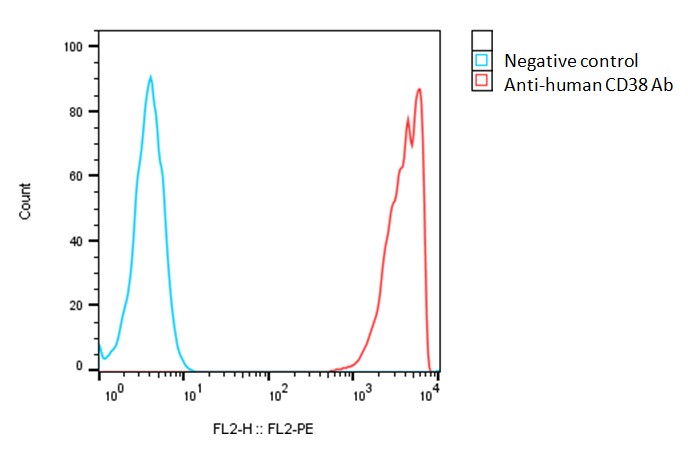
| Catalog Number | Product | Size | Price | |
|---|---|---|---|---|
| C3010 | Human CD38-CHO-K1 Stable Cell Line | 2 vials | $3950 | Order |
| Catalog Number | C3010 |
|---|---|
| Cell Line Name | Human CD38-CHO-K1 Stable Cell Line |
| Accession Number | NP_001766.2 |
| Host Cell | Adherent CHO-K1 |
| Quantity | Two vials of frozen cells (1x106 per vial) |
| Culture Medium | DMEM with 10% FBS, 4 µg/ml puromycin |
| Freezing Medium | 90% FBS and 10% DMSO |
| Storage | Liquid nitrogen upon receipt |
| Product Datasheet: | Download PDF |
Detection of human CD38 expression on human CD38-CHO-K1 stable cells using a monoclonal antibody specific for human CD38 (BioLegend, Cat #356604)

CD38, also known as cyclic ADP ribose hydrolase, is a transmembrane glycoprotein and an ectoenzyme belonging to the family of NAD(+) glycohydrolases. CD38 plays a crucial role in various cellular processes, including calcium signaling, cell adhesion, and modulation of immune responses. Its primary enzymatic activity involves the conversion of NAD(+) to cyclic ADP-ribose (cADPR), leading to the regulation of intracellular calcium levels and subsequent downstream signaling pathways. CD38 is widely expressed in various tissues throughout the human body, particularly in hematopoietic cells, including lymphocytes, monocytes, and dendritic cells. Additionally, CD38 expression has been observed in non-hematopoietic tissues such as the brain, kidney, and gastrointestinal tract. Alterations in CD38 expression have been implicated in several types of hematological malignancies, such as multiple myeloma, chronic lymphocytic leukemia, and acute lymphoblastic leukemia where CD38 is overexpressed and associated with disease progression and poor prognosis. Moreover, CD38 expression has been reported in solid tumors, including breast cancer, ovarian cancer, and prostate cancer, where it contributes to tumor growth, metastasis, and resistance to therapy. CD38 has emerged as a promising therapeutic target for cancer treatment. Monoclonal antibodies targeting CD38 exert their anti-tumor effects through various mechanisms, including antibody-dependent cellular cytotoxicity (ADCC), complement-dependent cytotoxicity (CDC), and direct inhibition of CD38 enzymatic activity. Additionally, small-molecule inhibitors of CD38 are being investigated as potential therapeutic agents for cancer and other diseases.
van de Donk NWCJ, Richardson PG, Malavasi F. CD38 antibodies in multiple myeloma: back to the future. Blood. 131(1):13-29. 2018.
Chillemi A, Zaccarello G, Quarona V, et al. Anti-CD38 antibody therapy: windows of opportunity yielded by the functional characteristics of the target molecule. Mol Med. 19(1):99-108. 2013.